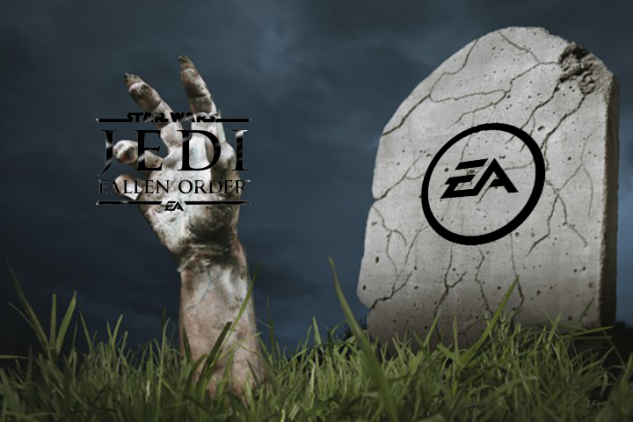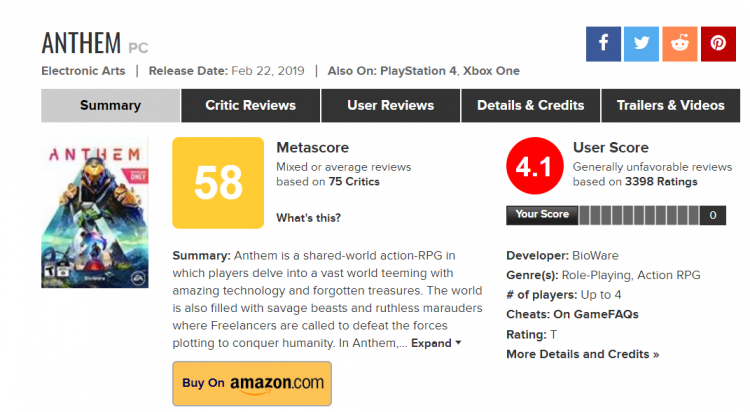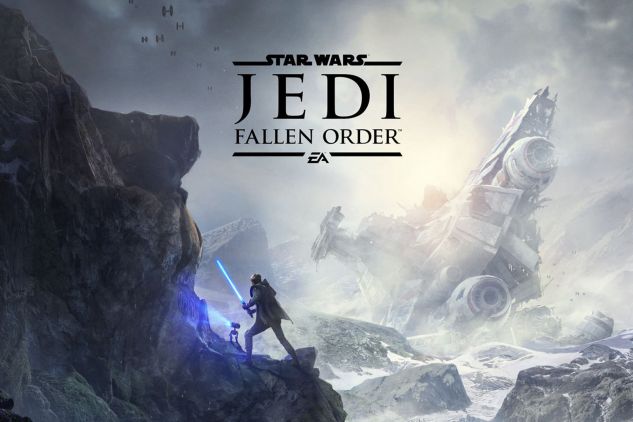It’s been a tumultuous several years for Electronic Arts (EA), a publisher that has been trending downward since 2012. And with the optimistic official reveal of Star Wars Jedi: Fallen Order, it appears the company wants to reshape its image into a publisher that actually cares about its consumer. Unfortunately, the industry has heard this story before.
EA has been viscerally scrutinized by player communities, developers, and critics for several of their major releases ever since they received the flattering moniker of “Worst Company in America,” twice in a row in 2012 and 2013.
Even now in 2019, it’s as if almost every move EA makes is met with resistance from the industry. And rightfully so: EA has taken several controversial strides in their management decisions that have resulted in serious backlash on the company and some of their most iconic franchises like Battlefield, Mass Effect and Star Wars Battlefront.
Last year’s Battlefield V was criticized by reviews stating it had released in an underdeveloped state and was not as refined as 2016’s Battlefield 1. Critics and players absolutely panned Mass Effect: Andromeda upon release because of its litany of bugs, glitches, half-baked mission structure, rushed development and overall busted release. Moments like the ones highlighted in this video are the result of a publisher pushing developers on a strict release schedule, on a proprietary game development engine, without the care necessary to produce a game of such caliber as an entry in the Mass Effect series. And that’s no dig at the developer Bioware, who’s released games like Mass Effect 2 and even 2014’s Dragon Age: Inquisition, all of which where widely praised upon release.
Most recently, Anthem exemplified EA’s troubling management strategy for development and publishing, as the release seemed to emulate all the major issues that Andromeda had to an even worse extent. Anthem was absolutely demolished upon release for its formulaic repetition of missions, the reward of these missions resulting in uninteresting in-game loot, and the forced narrative that was needlessly ambiguous and lifeless, and that’s all without referencing the numerous glitches as well. Not to mention franchises like Need for Speed or Medal of Honor which have either relentlessly struggled with every recent release or faded into memory entirely.
Perhaps the worst offender being Star Wars Battlefront 2, which received most of its criticism due to a justifiably frustrating feature: loot boxes. And not just cosmetic loot boxes. Loot boxes that could legitimately provide players with competitive advantages (such as locked heros/villains, equipment, weapons, etc.) that could only be acquired through randomized luck or obscenely long-term and consistent leveling.
“Star Cards” of varying degrees could provide randomized unlocks that, while normally are restricted behind experience/progression, could potentially be unlocked early. This contributed to a player community strengthened by wealth disparity, and made it impossible to enjoy the game in any casual capacity. This caused enough of an uproar for EA and the Battlefront developers to temporarily remove the micro-transactions from the game entirely in response to the backlash.
EA has consistently expressed a desire to care about the players of their games, and the teams behind them. And that’s not to say it’s unwarranted, as they’ve truthfully made a lot of good gestures on both sides of the industry; the players and the developers.
Without EA, We may never have seen such uniquely crafted and incredible games like Apex Legends, A Way Out, Unravel and Fe see as much success as they did without EA’s support. EA’s sports games have featured sponsored nationwide eSports tournaments for Madden and FIFA, elevating the community beyond just cashing in annually on each new release. EA does have a commitment to its devoted community despite all of their shortfalls.
But the truth is that it’s hard not to examine their track record and notice that their actions as a publisher have aligned perfectly with the metaphor: One step forward, two steps back.
Which is why it’s important to remain skeptical in the wake of Fallen Order’s official reveal and EA’s commitment to “No microtransactions. No loot boxes. And no, we won’t be adding them.” Even if this promise rings true (while it would be hilarious if they broke that promise), the fact that this statement garners praise is in and of itself unfortunate.
Luckily this game is being developed by Respawn, the team behind the innovative Titanfall franchise and the wildly successful Apex Legends. This is an important distinction because Apex and now Fallen Order are designed under Unreal Engine rather than Frostbite, EA’s proprietary game development engine. Since 2008, a growing majority of EA’s games were being built on iterations of the “Frostbite” engine, and around 2012, almost all of EA’s major releases were being developed on modified versions of Frostbite 2 and 3.
This, paired with their declaration on Twitter, shows signs of a very different EA, one that’s willing to venture beyond their established comfort zone during seemingly desperate times for the publisher. Publically acknowledging what’s been setting them back is an interesting step towards reform. EA potentially could garner a great comeback after a drastic gesture of good faith towards players, and it’s looking like they want Fallen Order to be that first step.
Under other circumstances this would be considered a highly speculative theory, but given EA’s history in these last eight years, it is a wildly contrasting development strategy to what they’re used to. It’s hard not to believe this is a radical step towards reshaping a positive image of their games and their company.
Only time will tell how EA fares in the near future with this new approach. These little tidbits (that may seem unrelated on their own) point to a company that’s, at the very least, willing to reflect and completely shift perspective to improve their consumer rapport and regain trust. As we get closer to Fallen Order’s release date as well as this year’s E3, we’ll hopefully get a better insight into EA’s future plans.





